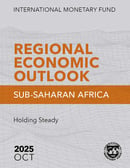<br>
This web page provides information in on the activities of the Office, views of the IMF staff, and the relations between Cameroon and the IMF. Additional information can be found on Cameroon and IMF country page, including official IMF reports and Executive Board documents in English and French that deal with Cameroon.
At a Glance
- Cameroon joined the Fund in July 10, 1963; Article VIII
- Total Quotas: SDR 276.00 Million (As of February 29, 2016)
- Loans outstanding: ESF RAC Loan SDR 65 Million
ECF Arrangements SDR 5.58 Million - Staff Report for the 2018 Article IV Consultation (Country Report No. 18/235, July 23, 2018)
Office Activities in Cameroon
Recent Economic Trends and Economic Outlook
Presentation
December 31, 2019
REO presentation given at the University of Dschang
December 1, 2019
Domestic Backlogs in Subsaharian Africa: Amount, Symptoms and Solutions
Presentation
October 26, 2019
Cameroon: Economic Recovery in a Context of Great Incertainty
REO Presentation
May 2, 2019
Déclaration de la Directrice générale du FMI, Christine Lagarde, au terme de sa visite au Cameroun
Communiqué de presse No. 16/03, le 10 janvier 2016
February 17, 2016
IMF's Work on Cameroon
No results found. Either there was an error with the web service or there is no data returned by the web service.
Regional Economic Outlook
October 16, 2025

The outlook for Sub-Saharan Africa is showing resilience, despite a challenging external environment with uneven prospects in commodity prices, still tight borrowing conditions, and a deterioration of the global trade and aid landscape.
Read the Report
Fraudulent Scam Emails Using the Name of the IMF
For more information please see Fraudulent Scam Emails Using the Name of the IMF
Departmental Papers on Africa
 The Departmental African Paper Series covers research on sub-Saharan Africa conducted by International Monetary Fund (IMF) staff, particularly on issues of broad regional or cross-country interest. The views expressed in these papers are those of the author(s) and do not necessarily represent the views of the IMF, its Executive Board, or IMF Management.
The Departmental African Paper Series covers research on sub-Saharan Africa conducted by International Monetary Fund (IMF) staff, particularly on issues of broad regional or cross-country interest. The views expressed in these papers are those of the author(s) and do not necessarily represent the views of the IMF, its Executive Board, or IMF Management.



